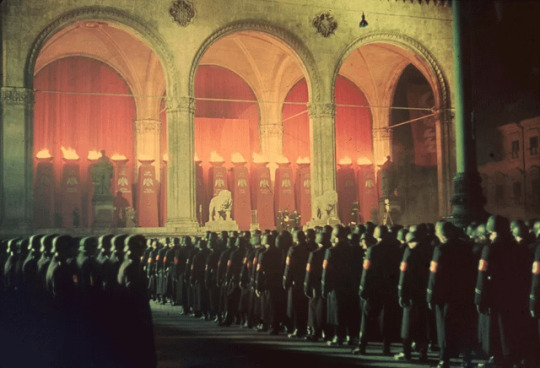#feldherrnhalle
Text
Where did all the statues go?
Where did all the statues go?
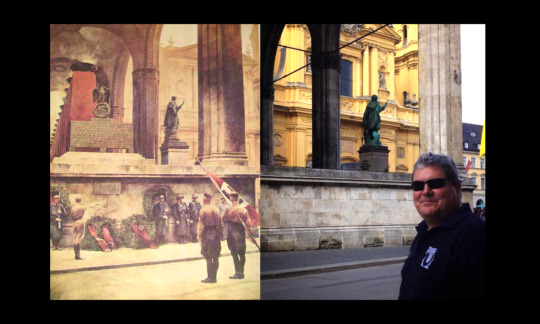
View On WordPress
#Adolf Hitler#Bürgerbräukeller#Blutfahne#Der neunte Elf#Fahnenweihe#Feldherrnhalle#General Erich Ludendorff#Gustav von Kahr#Hermann Goring#Mahnmal der Bewegung#Mein Kampf#Munich#Nazi Germany#Nazism#Odeonsplatz#Rudolf Hess#World War 2
1 note
·
View note
Photo

#münchen #munich #germany #bayern #instagood #love #deutschland #travel #photography #bavaria #picoftheday #photooftheday #oktoberfest #feldherrnhalle #odeonsplatz #theatinerkirche #herbst #munichphotography #sonnig #supersonnig #gelbekirche #streetphotography #straße #blauerhimmel #architecture #wiesnernews #canon #architecture (hier: Odeonsplatz) https://www.instagram.com/p/ClWwGGTtunC/?igshid=NGJjMDIxMWI=
#münchen#munich#germany#bayern#instagood#love#deutschland#travel#photography#bavaria#picoftheday#photooftheday#oktoberfest#feldherrnhalle#odeonsplatz#theatinerkirche#herbst#munichphotography#sonnig#supersonnig#gelbekirche#streetphotography#straße#blauerhimmel#architecture#wiesnernews#canon
1 note
·
View note
Photo

München // Klassik Am Odeonsplatz // Sir Simon Rattle
#bayern#bavaria#munich#münchen#muc#monacodibaviera#089#hofgarten#odeonsplatz#feldherrnhalle#classicism#arches#symmetry#symmetrical#classicalarchitecture#classicbeautyneverfades#everythingwasbetterintheolddays#klassikamodeonsplatz#sirsimonrattle#bayrischerrundfunk#syphonieorchester#brsynphonieorchester#openair#concert#concerttime#concertphotography#maytheforcebewithyou#starwars#johnwilliams
0 notes
Text
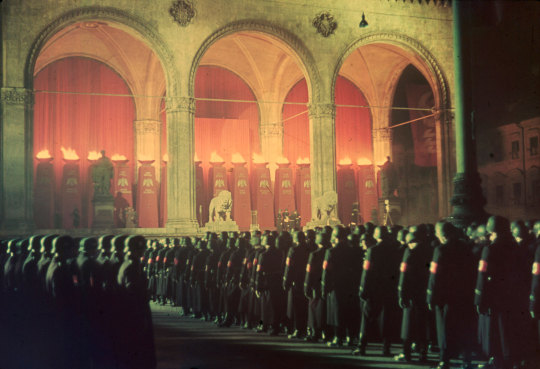
Mary Elaine LeBey:
TODAY'S FROZEN MOMENT - 85th Anniversary - September 5th, 1938 - this incredible photograph... the color, the composition, the horror... Here were Waffen-SS soldiers taking a communal loyalty oath at a Nazi rally in front of Munich's Feldherrnhalle
* * * *
“The modern masses do not believe in anything visible, in the reality of their own experience… What convinces masses are not facts, and not even invented facts, but only the consistency of the system of which they are presumably part.”
— Hannah Arendt, The Origins of Totalitarianism
[philosophybits]
+
“The American fascists are most easily recognized by their deliberate perversion of truth and fact. Their newspapers and propaganda carefully cultivate every fissure of disunity, every crack in the common front against fascism. With a fascist the problem is never how best to present the truth to the public but how best to use the news to deceive the public into giving the fascist and his group more money or more power.
A fascist is one whose lust for money or power is combined with such an intensity of intolerance toward those of other races, parties, classes, religions, cultures, regions or nations as to make him ruthless in his use of deceit or violence to attain his ends. The symptoms of fascist thinking are colored by environment and adapted to immediate circumstances.
But always and everywhere they can be identified by their appeal to prejudice and by the desire to play upon the fears and vanities of different groups in order to gain power. If we define an American fascist as one who in case of conflict puts money and power ahead of human beings, then there are undoubtedly several million fascists in the United States.”
—Henry A. Wallace, FDR's Vice-President
#Mary Elaine LeBey#Today's Frozen Moment#Waffen-SS#Nazis#Hannah Arendt#quotes#group think#Henry A. Wallace#fascist#American fascists#power
10 notes
·
View notes
Text
Interessantes Datum fürn Geburtstag... Happy Birthday for me
9. November 1313 : In der Schlacht von Gammelsdorf setzt sich der spätere Kaiser
Ludwig der Bayer gegen seinen Vetter
Friedrich den Schönen durch und erhält damit die Vormundschaft über die jugendlichen Herzöge von Niederbayern.
Hinrichtung des unter
parlamentarischer Immunität stehenden Robert Blum am 9. November 1848, (Gemälde von
Carl Steffeck , 1848/49)
9. November 1848 – standrechtliche Hinrichtung von Robert Blum:
Mit der Erschießung des republikanischen Parlamentsabgeordneten der Frankfurter Nationalversammlung nach dem
Oktoberaufstand in Wien wird zugleich auch die parlamentarische Immunität Blums durch die Militärführung im Dienst des österreichischen Kaiserhofs gebrochen. Die Niederschlagung des Wiener Oktoberaufstands und die Hinrichtung Blums gilt als offene Kampfansage der herrschenden Vertreter einer reaktionär -
restaurativen politischen Ordnung gegen das aus der bürgerlichen Märzrevolution in den Staaten des Deutschen Bundes hervorgegangene erste demokratisch gewählte gesamtdeutsche Parlament. Die Hinrichtung Blums markiert einen entscheidenden Wendepunkt in der Entwicklung der Deutschen Revolution von 1848/49 als Anfang vom Ende dieser Revolution.
9. November 1914 – Untergang der SMS Emden
9. November 1918 – Novemberrevolution in Berlin:
Philipp Scheidemann bei der Ausrufung der Republik am 9. November 1918
Der wenige Wochen zuvor berufene Reichskanzler Max von Baden verkündet angesichts der bevorstehenden Niederlage des Deutschen Reiches im Ersten Weltkrieg eigenmächtig die Abdankung von Kaiser Wilhelm II. und betraut Friedrich Ebert ( SPD ) mit den Amtsgeschäften. Eberts Genosse
Philipp Scheidemann , der ihn im Februar 1919 als Regierungschef ablösen wird, ruft von einem Fenster des Reichstagsgebäudes die „ Deutsche Republik “ aus. Am selben Tag, jedoch einige Stunden später, verkündet Karl Liebknecht, einer der Anführer des linksrevolutionären Spartakusbundes , vom
Berliner Stadtschloss aus eine als
Räterepublik gedachte Freie Sozialistische Republik Deutschland.
In den nachfolgenden, regional teilweise bürgerkriegsähnlichen Auseinandersetzungen zwischen den Verfechtern einer sozialistischen Räterepublik und denen einer pluralistisch-parlamentarischen Demokratie unterliegen die Anhänger des Rätemodells. Liebknecht selbst wird zwei Monate später zusammen mit Rosa Luxemburg am 15. Januar von reaktionären Freikorps ermordet. In der weiteren Folge wird im August 1919 das als
Weimarer Republik bezeichnete erste demokratisch strukturierte Staatswesen in Deutschland konstituiert (benannt nach der in Weimar tagenden Nationalversammlung ).
9. November 1923 – Hitler-Ludendorff-Putsch in München: Der Nationalsozialismus wird erstmals international wahrgenommen.
Adolf Hitler, der bis dahin in der breiten Öffentlichkeit kaum bekannte Parteichef der
NSDAP , unternimmt einen Putschversuch gegen die demokratische Reichsregierung bewusst am 5. Jahrestag der Ausrufung der Republik. Das Unternehmen, das 16 Todesopfer fordert, scheitert bereits nach wenigen Stunden vor der Münchner
Feldherrnhalle . Hitler nutzt den anschließenden Prozess, um sich als Führungsfigur der völkischen Bewegung zu inszenieren. Er wird zu fünf Jahren
Festungshaft verurteilt, aber bereits nach neun Monaten „wegen guter Führung“ vorzeitig entlassen. Als er zehn Jahre später an die Macht gelangt und eine totalitäre
Diktatur in Deutschland errichtet, erklärt er den 9. November zu einem Gedenk- und Feiertag. An ihm finden während der NS-Diktatur alljährlich staatliche Trauerfeiern statt, bei denen der sogenannten „ Blutzeugen der Bewegung“ gedacht wird.
50. Jahrestag der Reichspogromnacht (9. November 1938): Briefmarke der Deutschen Bundespost, 1988
9. November 1936 : In der Nacht vom 9. zum 10. November entfernen die Nationalsozialisten das Denkmal des Komponisten Felix Mendelssohn Bartholdy vor dem Leipziger Gewandhaus . Der Leipziger Oberbürgermeister Carl Friedrich Goerdeler , der sich zu diesem Zeitpunkt auf einer Auslandsreise befindet, erklärt daraufhin unter Protest seinen Rücktritt.
9. November 1938 – Scheitelpunkt der
Novemberpogrome (7. bis 13. November): Nach einem Mordanschlag auf einen deutschen Diplomaten in Paris inszenieren die Nationalsozialisten die Novemberpogrome (bis in die Gegenwart ist die Nacht vom 9. auf den 10. November 1938 oft auch unter dem euphemistischen Begriff „ Reichskristallnacht “ bekannt). In der NS- Propaganda werden die vor allem von
SA - und SS -Mitgliedern in Zivilkleidung begangenen Ausschreitungen als Ausdruck des „Volkszorns“ gegen die Juden dargestellt. Im ganzen Gebiet des Deutschen Reiches werden jüdische Geschäfte und Einrichtungen demoliert, Synagogen in Brand gesteckt. Hunderte von Juden werden innerhalb weniger Tage ermordet. Diese Ereignisse markieren den Übergang von der sozialen Ausgrenzung und Diskriminierung zur offenen Verfolgung der Juden in der
Diktatur des Nationalsozialismus . Während des Zweiten Weltkriegs mündet der
Antisemitismus in Deutschland in den heute als Holocaust bezeichneten industriell betriebenen Völkermord an etwa sechs Millionen europäischen Juden und weiteren aus rassistischen Motiven ausgegrenzten Bevölkerungsgruppen in den
Vernichtungslagern des NS-Regimes.
9. November 1939 : Kurz nach Ausbruch des Zweiten Weltkriegs werden zwei Offiziere des britischen Secret Intelligence Service ,
Richard Henry Stevens und Sigismund Payne Best , im niederländischen Venlo von einem SS-Sonderkommando unter Alfred Naujocks entführt, nachdem sich deutsche Geheimagenten unter Walter Schellenberg für Widerstandskämpfer ausgegeben haben. Der Venlo-Zwischenfall macht große Teile des britischen Spionagenetzes in Europa praktisch wertlos und liefert Hitler im Mai 1940 einen Vorwand für den Einmarsch in den Niederlanden.
9. November 1955 : Das deutsche
Bundesverfassungsgericht urteilt, dass in Deutschland lebende Österreicher, die mit dem „Anschluss“ 1938 die deutsche Staatsbürgerschaft bekamen, diese mit der
Souveränität Österreichs wieder verloren haben.
9. November 1967 : Bei der feierlichen Amtseinführung des neuen Rektors der Hamburger Universität entfalten Studenten ein Transparent mit dem Spruch Unter den Talaren – Muff von 1000 Jahren , der zum Symbol der 68er-Bewegung werden wird.
9. November 1969 : Die linksradikale Organisation Tupamaros West-Berlin platziert eine Bombe im Jüdischen Gemeindehaus in Berlin. Die Bombe explodiert jedoch nicht.
9. November 1974 : Nach 58 Tagen Hungerstreik stirbt RAF-Mitglied Holger Meins in der Justizvollzugsanstalt Wittlich.
9. November 1989 – Mauerfall :
Die Öffnung der deutsch-deutschen Grenze verdeutlicht und verstetigt den Erfolg der
friedlichen Revolution in der DDR , dem am 3. Oktober 1990 mit dem Beitritt der DDR zur Bundesrepublik Deutschland die
deutsche Wiedervereinigung folgt (siehe auch Geschichte der Bundesrepublik Deutschland (bis 1990) und Geschichte der Deutschen Demokratischen Republik ).
Als Datum des Mauerfalls ist der 9. November zeitweilig als Nationalfeiertag des vereinigten Deutschland im Gespräch. Auch aus Rücksicht auf das Gedenken an den 9. November 1938 wird im Einigungsvertrag 1990 ( Art. 2 Abs. 2 EV ) jedoch der 3. Oktober zum Tag der Deutschen Einheit bestimmt.
9 notes
·
View notes
Text
My Virtual Escape 2 - Chapter 2
On April 1st, 1924, I began to serve my sentence of detention in the Fortress of Landsberg am Lech, following the verdict of the Munich People's Court of that time. After years of uninterrupted labour it was now possible for the first time to begin a work which many had asked for and which I myself felt would be profitable for the Movement. So I decided to devote two volumes to a description not only of the aims of our Movement but also of its development. There is more to be learned from this than from any purely doctrinaire treatise. This has also given me the opportunity of describing my own development in so far as such a description is necessary to the understanding of the first as well as the second volume and to destroy the legendary fabrications which the Jewish Press have circulated about me. In this work I turn not to strangers but to those followers of the Movement whose hearts belong to it and who wish to study it more profoundly. I know that fewer people are won over by the written word than by the spoken word and that every great movement on this earth owes its growth to great speakers and not to great writers. Nevertheless, in order to produce more equality and uniformity in the defence of any doctrine, its fundamental principles must be committed to writing. May these two volumes therefore serve as the building stones which I contribute to the joint work. The Fortress, Landsberg am Lech. At half-past twelve in the afternoon of November 9th, 1923, those whose names are given below fell in front of the FELDHERRNHALLE and in the forecourt of the former War Ministry in Munich for their loyal faith in the resurrection of their people: Alfarth, Felix, Merchant, born July 5th, 1901 Bauriedl, Andreas, Hatmaker, born May 4th, 1879 Casella, Theodor, Bank Official, born August 8th, 1900 Ehrlich, Wilhelm, Bank Official, born August 19th, 1894 Faust, Martin, Bank Official, born January 27th, 1901 Hechenberger, Anton, Locksmith, born September 28th, 1902 Koerner, Oskar, Merchant, born January 4th, 1875 Kuhn, Karl, Head Waiter, born July 25th, 1897 Laforce, Karl, Student of Engineering, born October 28th, 1904 Neubauer, Kurt, Waiter, born March 27th, 1899 Pape, Claus von, Merchant, born August 16th, 1904 Pfordten, Theodor von der, Councillor to the Superior Provincial Court, born May 14th, 1873 Rickmers, Johann, retired Cavalry Captain, born May 7th, 1881 Scheubner-Richter, Max Erwin von, Dr. of Engineering, born January 9th, 1884 Stransky, Lorenz Ritter von, Engineer, born March 14th, 1899 Wolf, Wilhelm, Merchant, born October 19th, 1898 So-called national officials refused to allow the dead heroes a common burial. So I dedicate the first volume of this work to them as a common memorial, that the memory of those martyrs may be a permanent source of light for the followers of our Movement. The Fortress, Landsberg a/L., October 16th, 1924 TRANSLATOR'S INTRODUCTION In placing before the reader this unabridged translation of Adolf Hitler's book, MEIN KAMPF, I feel it my duty to call attention to certain historical facts which must be borne in mind if the reader would form a fair judgment of what is written in this extraordinary work. The first volume of MEIN KAMPF was written while the author was imprisoned in a Bavarian fortress. How did he get there and why?
0 notes
Text
The Beer Hall Putsch, also known as the Munich Putsch,[1][note 1] was a failed coup d'état by Nazi Party (Nationalsozialistische Deutsche Arbeiterpartei or NSDAP) leader Adolf Hitler, Generalquartiermeister Erich Ludendorff and other Kampfbund leaders in Munich, Bavaria, on 8–9 November 1923, during the Weimar Republic. Approximately two thousand Nazis marched on the Feldherrnhalle, in the city centre, but were confronted by a police cordon, which resulted in the deaths of 16 Nazis, four police officers, and one bystander.[2][3]
Hitler escaped immediate arrest and was spirited off to safety in the countryside. After two days, he was arrested and charged with treason.[4]
The putsch brought Hitler to the attention of the German nation for the first time and generated front-page headlines in newspapers around the world. His arrest was followed by a 24-day trial, which was widely publicised and gave him a platform to express his nationalist sentiments to the nation. Hitler was found guilty of treason and sentenced to five years in Landsberg Prison,[note 2] where he dictated Mein Kampf to fellow prisoners Emil Maurice and Rudolf Hess. On 20 December 1924, having served only nine months, Hitler was released.[5][6] Once released, Hitler redirected his focus towards obtaining power through legal means rather than by revolution or force, and accordingly changed his tactics, further developing Nazi propaganda.[7]
0 notes
Text
100 Jahre Hitlerputsch: Wer gab das Geld?
Compact:»Vor 100 Jahren führte Adolf Hitler seinen Marsch auf die Feldherrnhalle durch. Der Putsch scheiterte, doch schon damals hatte der NSDAP-„Führer“ mächtige Hintermänner. Die bei Amazon schon inkriminierte und hochbrisante Ausgabe „Wer finanzierte Hitler? – Das dunkle Geheimnis der Wall Street“ gibt natürlich weiterhin es in unserem Online-Shop. Die Megadebatte zwischen kommunistischen und westlichen Historikern um die [...]
Der Beitrag 100 Jahre Hitlerputsch: Wer gab das Geld? erschien zuerst auf COMPACT. http://dlvr.it/SychyB «
0 notes
Text
100 Jahre Hitlerputsch / MINGA-Stammtisch
Am 9. November 1923 – also vor 100 Jahren – unternahmen Hitler und Ludendorff mit mehreren tausenden, zum Teil schwer bewaffneten Gefolgsleuten, einen Putschversuch, der an der Feldherrnhalle kläglich scheiterte.
Dieses Scheitern inszenierten die Nationalsozialisten den 9. November zu einem Feiertag. Im Rahmen dessen rief 1938 Goebbels im Alten Münchner Rathaus zum Pogrom gegen die jüdische…

View On WordPress
0 notes
Text
100 Jahre Hitlerputsch / MINGA-Stammtisch
Am 9. November 1923 – also vor 100 Jahren – unternahmen Hitler und Ludendorff mit mehreren tausenden, zum Teil schwer bewaffneten Gefolgsleuten, einen Putschversuch, der an der Feldherrnhalle kläglich scheiterte.
Dieses Scheitern inszenierten die Nationalsozialisten den 9. November zu einem Feiertag. Im Rahmen dessen rief 1938 Goebbels im Alten Münchner Rathaus zum Pogrom gegen die jüdische…

View On WordPress
0 notes
Text
100 Jahre Hitlerputsch in München: Kein Platz für Nazis!

Am 9. November 1923 – also vor 100 Jahren – unternahmen Hitler und Ludendorff mit mehreren tausenden, zum Teil schwer bewaffneten Gefolgsleuten, einen Putschversuch, der an der Feldherrnhalle kläglich scheiterte.
Trotz dieses Scheiterns inszenierten die Nationalsozialisten den 9. November zu einem Feiertag. Im Rahmen dessen rief 1938 Goebbels im Alten Münchner Rathaus zum Pogrom gegen die jüdische Bevölkerung auf.
Dies war der Beginn der von den Nazis inszenierten "Reichskristallnacht", dem Auftakt der nationalsozialistischen November-Progrome. Diesem antisemitischen Infernal fielen die Hauptsynagoge und unzählige jüdische Geschäfte und Bürger:innen zum Opfer.
Bis heute versammeln sich in dieser Tradition rechte Gruppierungen an diesem Tag. Das wollen und werden wir verhindern. Wir werden diesen Tag und den Odeonsplatz als Bühne nicht den Rechten überlassen - Kein Platz für Nazis!
Die erstarkende Rechte greift unsere Demokratie und unsere offene Gesellschaft an. Unverhohlen verschieben die Rechten den Diskurs und die Grenze des Sagbaren und ernten dafür immer häufiger Applaus aus der Mitte der Gesellschaft. Zunehmende Ausgrenzung, öffentliche Drohungen, Hetze und Gewalt sind schon heute wieder an der Tagesordnung. Deswegen setzen wir ein lautes und sichtbares Zeichen für eine lebendige Demokratie und eine solidarische Gesellschaft der Vielfalt und Toleranz.
Programm:
o 17:30 Beginn
o Es sprechen: Christian Ude, Dr. Prantl sowie der Leiter des Stadtarchivs Dr. Baumann
o Musik von Jisr und Queen Lizzy
Es rufen auf: München ist bunt!; KjR München Stadt; ver.di aktiv gegen rechts München; DGB München; BUND Naturschutz; StadtschülerInnenvertretung #München
Read the full article
0 notes
Text
The city of which I speak is Munich at the end of the Regency-with only four years left until a war that would change its cozy sociability into chronic depression, bringing forth one sad grotesquery after another-this capital of beautiful vistas, whose political problems were confined to a peevish antagonism between a semi-separatist popular Catholicism and a lusty liberalism whose loyalty to the Reich was of the true-blue sort: Munich with its concerts in the Feldherrnhalle for the changing of the guard, its art galleries, its palaces of interior decoration and seasonal exhibitions, its rustic balls during carnival, its drunken binges on March ale, its weeklong monster fair held on October Meadow, where a defiantly lusty folksiness, long since corrupted by modern mass-marketing, celebrated its Saturnalias; Munich with its fusty Wagnerism and its esoteric coteries celebrating aesthetic galas just beyond the Victory Gate by night, with its utterly comfy Bohemianism bedded in public approval.
— Thomas Mann, Doctor Faustus
0 notes
Text
Okay, we got the flash mob, I like to be called out on them. Okay, it's fm #singingbooks.
Bring up book excerpts, where your characters sing.

I'll post pieces separately, probably today, tomorrow and the day after tomorrow))))
I won't call to flashmob anyone, but who will join - I will gladly read everyone))) just poke me.
Well. I have the singing in three books at a glance.
In "Extra puzzles.To where you are waited" (a strait to the portrait of the hero, to confirm the psychtype), in "I am here" (plot-forming), well, and in "#Bottomless" of course, my averche sings, the book is all about him, and he sings. For me, of course, he does it the best. Well, because he sings for me)))
- Sing! Sing![1] - the passing Germans shout sun-drunkly.
It's a sunny day. Averche smiles at me, I sit so that he can see me with his side vision.
"What are they shouting?" Asen asks.
"Sing," I translate.
He shakes his head. He plays very well, but no one notices, as I said, usually, because people only see Mariyan, come up to shake Mariyan's hand, thank Mariyan, ask Mariyan questions. They want to touch the beauty. And Mariyan accustomed. Accustomed to the admiration that everyone needs. So much so that he stopped appreciating it.
I was surprised at first, because where he and I come from, we are taught the laws of life, we are taught to be grateful, we are taught not to push away an outstretched hand and to give it to the one who has fallen, we are taught to appreciate the attention given to us, and even more so, admiration. And so I looked at the way Mariyan behaves with people and thought - why are you so queen, my boy! I wondered for a long time. And then I realized, after Munich, already. All my life I have been yelling at every corner with a stream of admiration that he is the most beautiful. And all the garbage stuck, wanting to suck on the stream itself. Like, if they're near, maybe they'll get part of admiration addressed to him, or maybe it'll just taste good. Because for all eternity my averche was not needed by anyone but me. And suddenly all need him, furore tsatsa[7]. Although, of course, as a person, with all the flaws, doubts, fears and failures, he is still only needed by me. Pay attention, if someone suddenly begins to be liked by everyone, it means he has someone who needs him sincerely, and everyone else already likes someone's love for him itself. Because we love admiration so much and want to relate to it in any way we can.
"Sing something," I say, still smiling.
He nods and starts "Bella ciao[2]" for some reason. I marvel, I didn't realize the guys knew that song. I nod approvingly and smile. Well of course, as you would expect, Averche doesn't know the lyrics. He only sings the chorus, but they know how to play the melody, and the Germans gather, start singing along, someone knows the lyrics, the crowd sings along, someone dances. Seeing the anti-fascist joy in the center of Munich, couples dancing in front of the Feldherrnhalle[3], is very gratifying. Remembering the terrible and precise words of Ilya Ehrenburg[4], it is always a joy to see the celebration of life.
There is a song by Yaroslav Yevdokimov, "May Waltz," a dizzying royal voice, words by Mikhail Yasen. The author of the words was there, in Vienna in the forty-fifth year, so when you listen to the song, you can perfectly imagine how it was. And now, in Munich, to "Goodbye, Beautiful", I saw May of the forty-fifth for real.
Of course, we can hold any mood we want, I and he. Sometimes we schlep the hell out of that game at the Elephant[5] Café, stealing moments of our joy from the physical universe. Mariyan looks at me, smiles, stops repeating "Bella ciao" and spills out the anti-fascist, only Bulgarian, song "Nikola"[6]. The Germans, as if realizing that the idea of the song is the same, they smile and continue dancing. Someone wipes their tears. After the song, everyone claps. Someone comes up to him, says something, he answers in English. Someone switches to English. Someone comes to me, I smile, explain and answer in German. The Germans are joyful, they ask me questions. We laugh. Mariyan, periodically, warily and angrily looks in my direction.
A German woman comes up and starts speaking in Russian. She has a nice accent, it's obvious that she hasn't spoken it for a long time, but she speaks well. Mariyan also switches to Russian. He wonders how she knows the language so well. She's from East Germany. She was an intern in Moscow, studied Russian at the University. She has been living in Munich for many years now, and has a rich husband. She tells us with longing how good it was in East Germany, there was sense, she says, there was friendship, there was hope that there would be no hostility.
"But now everything is fake and there's nothing to live for," she waves her hand. "But let's live, maybe we'll live to time, eh?"
"Of course we will. Eternity is long," I say in German.
She laughs, shakes my hand, buys a disk.
We do not have such a culture, for a hundred years of human life, the desire to humiliate another has been etched out of people who stand farthest from the monkey. In the young USSR there were signs: "don't insult a catering worker with a tip". I'm ashamed to tip street musicians. I'm ashamed to tip waiters. I get, I get everything, that the shame should not be on me and not on the person I am tipping, the shame should be on the governments under which people are forced to rely on handouts. I get really well that under capitalism it is considered normal to humiliate a person with a handouts. I have watched in horror as people teach their children, barely able to walk, to handout. I'm not ashamed of myself, of course, I'm ashamed to humiliate a human being. I wouldn't want to get a handout for my labor. I would like to get payment for it. So, of course, I didn't handout Mariyan. I called him back into my life and told him he could use everything I had.
As she walks away, Mariyan looks at me in amazement.
"What kind of people... where do people like this come from? I mean, these are different people, completely different. It's like they're made differently."
"It's the red gene," I say. "Such people are the furthest along in evolutionary development from apes to human."
"Why are they like that? How did they get like that here?" Mariyan continued to smile with familiar admiration. It is our joyful surprise when we meet a human being with a spark of Human.
That's where our moment ends. His eyes are fading. "Don't go away..." - I turn away so he won't hear. Because otherwise he couldn't leave.
On the collage is the Feldhernhalle itself, and the place nearby where we played)) and the singer himself))))
[1] Sing. - sing (ger.)
[2]An Italian folk song of members of the Resistance movement in the Modena Mountains during World War II, which gained worldwide fame in the late 1940s.
[3]Hall of Bavarian warlords. The Feldherrnhalle carried considerable meaning under National Socialism.
[4]But among the fifty million victims of the Second World War there is not one: fascism. He survived May 1945, he ached, he moped, but he survived.
During the war years, I repeated day after day: we must come to Germany to destroy fascism. I was afraid that all the sacrifices, the exploits of the Soviet people, the bravery of the partisans of Poland, Yugoslavia, France, the grief and pride of London, the furnaces of Auschwitz, the rivers of blood - all this could remain the Bengal fire of victory, an episode of history, if low, impure politics prevailed again.
I wrote in 1944: "The French writer Georges Bernanos, a militant Catholic, rejecting with indignation the attempts of some democrats to stand up for fascism, wrote in "La Marseillaise": "Before the war, a large part of public opinion in England, in America, in France justified, supported, praised fascism. I repeat - not only allowed fascism, but promoted it in the hope, I say foolishly, of controlling this plague, of using it against its rivals and competitors... Munich was not mere foolishness. Munich was the dastardly denouement of a speculative scheme..." Unfortunately, there are still people who want to keep the contagion "in reserve", only diluting the broth in which the plague bacteria breed... We must remember: fascism was born from the greed and stupidity of some, from the cunning and cowardice of others. If humanity wants to end the bloody nightmare of these years, it must end fascism. If fascism is left somewhere to be divorced, rivers of blood will flow again in ten or twenty years... Fascism is a terrible cancerous tumor, it cannot be treated with mineral water, it must be removed. I do not believe in the good heart of people who cry over the executioners, these supposed do-gooders are preparing the death of millions of innocents."
Ilya Ehrenburg.
"People, Years, Life."
[5]A touching love scene from the movie 17 Moments of Spring, when the Soviet spy, undercover - Stirlitz meets his wife, they are not allowed to approach each other, cannot talk, can only look at each other. They haven't seen each other in a very long time.
[6]Nikola Kostadinov Parapunov was a member of the Bulgarian Communist Party, a partisan commander, and a figure in the anti-fascist movement.
[7] Russian slang, it means arrogant person, who express their arrogance brightly.
#Bottomless can be read here: https://albireo-mkg.com/product/bottomless
It's in Russian, but in English coming soon

0 notes
Text
youtube
Hitler's Personality Cult: Forerunner to Trump's Cult
One century ago, Hitler was sentenced to prison for his role in the Beer Hall Coup of Nov 8, 1923. The Beer Hall Coup was a failed coup attempt in Munich by Nazi Party leader Adolf Hitler during the Weimar Republic. Approximately two thousand Nazis marched on the Feldherrnhalle, in the city center, but were confronted by a police cordon. The attempted coup was foiled by the government, and Hitler was charged and convicted of high treason. Germany had been in the midst of a national crisis in the early 1920s. After World War I, its economy was in shambles, and inflation caused widespread discontent. Hitler and the Nazis stepped into this breach with demagoguery that attracted a significant following throughout the nation. The failed coup turned out to be quite a boon for Adolf Hitler. His trial brought him more attention and publicity than ever before. With a crowd of thousands - including press from around the world - watching the proceedings, Hitler made the most of this opportunity by going on the offensive. Taking every chance to turn the subject away from the coup attempt itself, Hitler frequently made speeches about Germany’s postwar plight. He blamed the leftists for all the country’s problems, repeatedly returning to his theme of nationalism: "Let's make Germany great again." It soon became evident that Hitler was winning the public relations battle by using the 25-day trial as a showcase for his extreme right-wing views, even if he was technically losing the legal case. Hitler was found guilty of treason and sentenced to five years in Landsberg Prison. Hitler spent the remainder of the year in prison writing the first volume of Mein Kampf. On December 20th, 1924, having served only nine months, Hitler was released. By the time of his release, he had become more popular than ever, and he went on to take over Germany.
Website.. GloryToGodVideos.com
#antichrist trump#antichrist#trump antichrist#the antichrist#the beast#666 antichrist#bible study#mark of the beast#bible prophecy#bible#Youtube
0 notes
Text


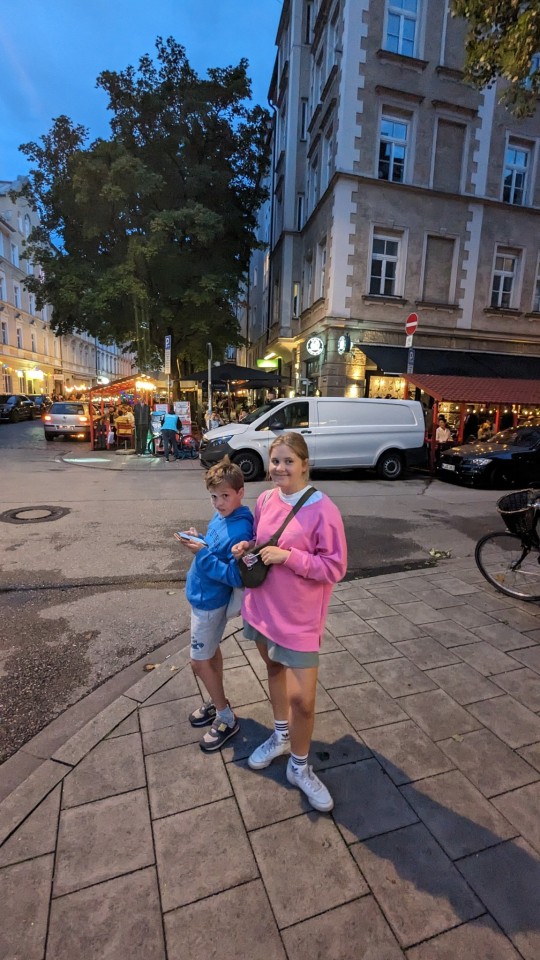
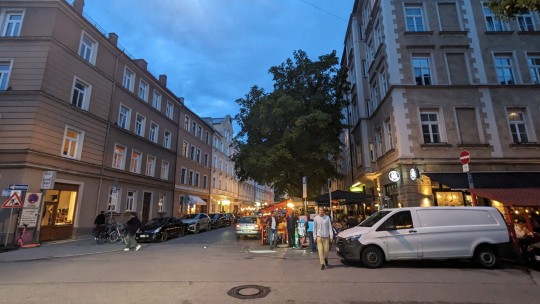

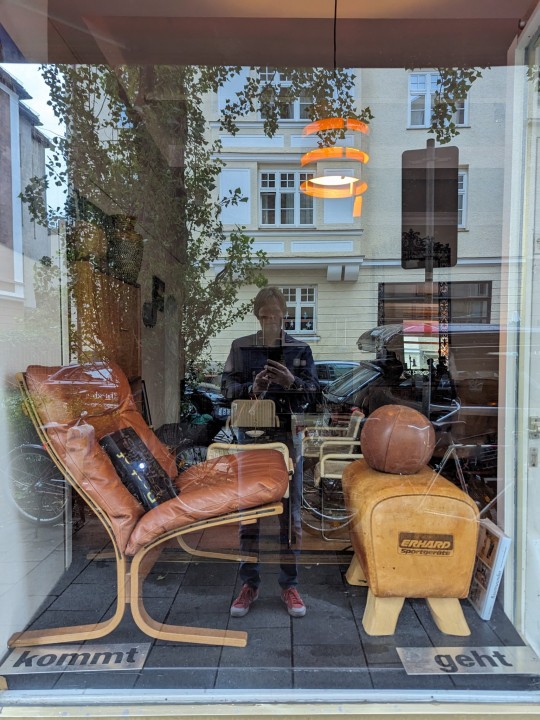

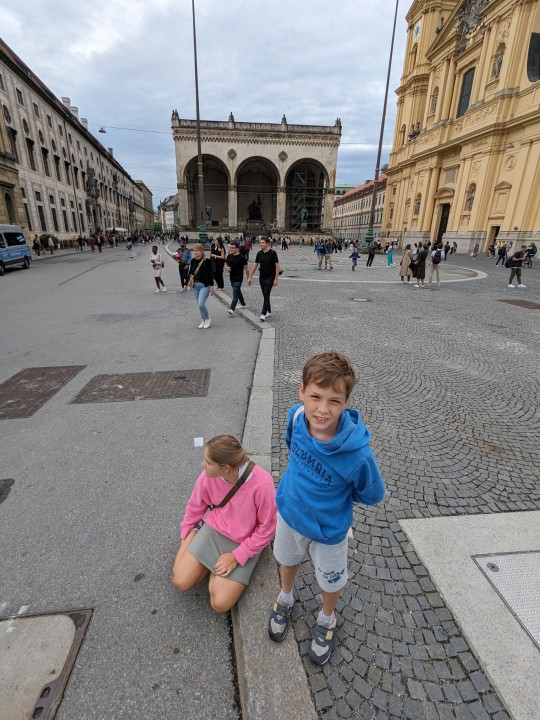
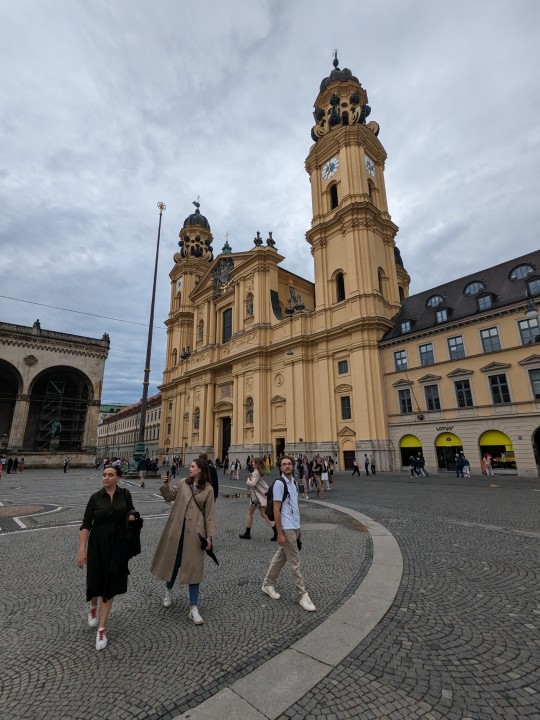

München, Theatinerkirche, Feldherrnhalle, U- Bahn mit Farbe und Eis, Schnitzel heute bei der Waldfee in Schwabing und Walk zurück, das Hotel zwar weit draußen, aber...ruhig (echt!) Und: schöne Idee für das alte Ledersportgerät👍
München im Juli 2023
0 notes
